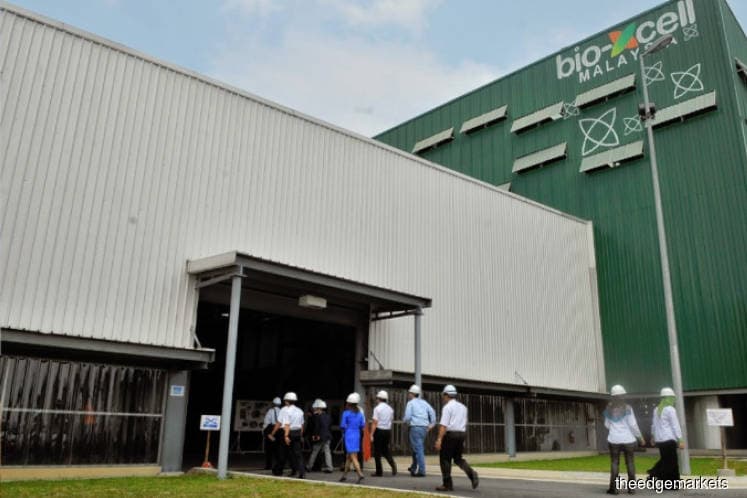
This article first appeared in The Edge Malaysia Weekly on July 29, 2019 - August 4, 2019
BIOCON Ltd, India’s largest biopharmaceutical company, has offered to buy the central utilities facility (CUF) and an eight-acre parcel owned by Malaysian Bio-XCell Sdn Bhd (Bio-XCell) for RM25 million, according to sources familiar with the deal.
The sale was done via receiver and manager (R&M) AdamPrimus Chartered Accountants, which was appointed by Maybank Islamic Bhd in March, after Bio-XCell became insolvent in February 2019.
Bio-XCell has a RM130 million outstanding credit facility with Maybank Islamic secured against its assets, including land and the CUF.
“Biocon has already received a conditional letter of offer from AdamPrimus. There are a few key condition precedents that need to be sorted out within 90 days,” a source says.
Interestingly, Biocon was not the only party interested in acquiring the CUF. Sources say a private Malaysian company had also submitted a proposal for the facility. However, the offer did not meet R&M’s criteria.
If the sale goes through, Biocon will own the CUF in Bio-XCell Biotechnology Park in Johor. The CUF provides industrial steam, chilled water and a centralised wastewater management system for the park’s tenants.
Presently, Biocon is the only buyer for the CUF as other investments planned in the past did not materialise. Needless to say, the facility is under-utilised, leading to financial losses of RM1 million a month, says a former official of Bio-XCell.
“The CUF is an important asset of the park. Since there is only one customer, it has been losing money for Bio-XCell. At the same time, the CUF cannot be shut down because doing so will impact Biocon’s operations,” the former official says.
“When Biocon was informed that the CUF was shutting down as Bio-XCell had become financially insolvent, Biocon quickly proposed to take over the facility. That shows the importance of the CUF to Biocon’s operations,” the former official adds.
Bio-XCell was established in 2009 — through a 60:40 joint venture between Malaysian Bioeconomy Development Corp Sdn Bhd (Bioeconomy Corp) and UEM Sunrise Bhd — to accelerate the commercialisation of the biotechnology industry in Malaysia.
The company is part of the Malaysian government’s effort to promote the growth of the national bioeconomy, which is also supported by tax incentives through the BioNexus status programme.
While Malaysia has the cost advantage over developed countries and a sound national economic blueprint, Bio-XCell did not manage to attract investors. Investors have expressed interest in setting up a plant, but Biocon remains the only buyer of the CUF to this day.
A Companies Commission of Malaysia search found that in FY2017, the loss-making Bio-XCell had accumulated RM207.36 million in losses.
UEM Sunrise’s annual report for the financial year ended Dec 31, 2018, shows that Bio-XCell recorded a net loss of RM27.83 million on revenue of RM16.95 million. UEM Sunrise and Bio-XCell have the same financial year-end.
The total liabilities of Bio-XCell for that year amounted to RM212.17 million, of which RM62.24 million is current. The company had net tangible assets of RM219.6 million, the report says.
In May, Bio-XCell’s R&M invited offers for freehold parcels of various sizes within the Southern Industrial and Logistics Cluster (SiLC) in Iskandar Puteri, Johor. About 80 acres of land, which form the Bio-XCell park within SiLC, were put up for sale to recover the loan.
SiLC is a 1,300-acre industrial park by UEM Sunrise, a 66.06%-owned subsidiary of UEM Group Bhd, which in turn is a 100% investee company of Khazanah Nasional Bhd. According to Bio-XCell’s website, the industrial park covers a 160-acre site within SiLC.
The sale of the CUF and the eight-acre parcel is the first part of the receivership process, sources familiar with the deal say. It is not clear whether Bio-XCell’s assets will be enough to cover the RM240 million loan from Maybank Islamic.
Since the loan is an Islamic financing facility, once Bio-XCell defaults on the loan, the entire amount, including future profits, are due. However, Maybank Islamic has the sole discretion to offer a rebate to the debtor.
The sale of the CUF to a foreign investor calls into question whether the Bio-XCell biotechnology park will remain as an industrial park backed by the government. If the sale follows through, will Biocon allow other investors to use the CUF services?
Another source involved with the sale says that Biocon will have to provide other investors with services from the CUF if it acquires the facility.
“By having a centralised facility supplying industrial steam and chilled water, the cost of setting up a plant is lowered by about RM30 million, reducing operating costs by about 15%.
“The CUF is one of the reasons why Biocon decided to invest in Johor, apart from other incentives provided by the government for biotechnology companies. There are other companies that are looking at Bio-XCell because of the CUF and the incentives,” says the source.
An industrial observer opines that Biocon would want to allow other investors access to the CUF services as that will increase its utilisation rate and reduce losses. Biocon may be expanding its plant there, which will improve the CUF utilisation rate.
Biocon had invested in Bio-XCell in October 2010. The Bangalore-based company had put in more than RM1 billion in the Iskandar Puteri plant — its first overseas manufacturing facility — since then.
The investment by Biocon was touted as a strategic investment that would propel Malaysia’s biotechnology industry to the next level as the first high-end bio-similar and biopharmaceutical manufacturing and research and development facility.
Save by subscribing to us for your print and/or digital copy.
P/S: The Edge is also available on Apple's AppStore and Androids' Google Play.